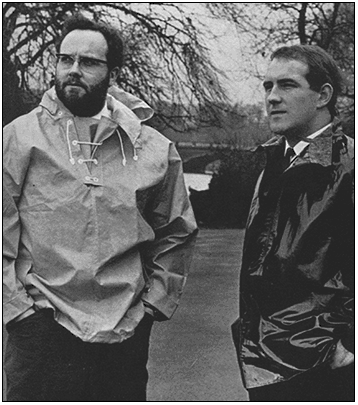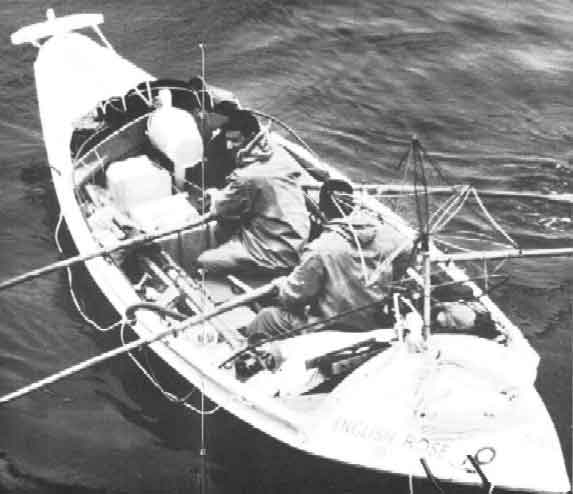|
|
||||
|
Memorial to rower who died in failed Atlantic attempt |
||||
|
21st February 2003 |
By NeiII Barston |
|||
|
† A bittersweet comment from Captain John Ridgway MBE, who successfully rowed the Atlantic with Chay Blyth in 1966 - beating Farnham journalist David Johnstone, who died in the attempt just two weeks earlier.†
Thirty-seven years after David's tiny boat was discovered eerily empty in mid-Atlantic, a memorial is being set up to honour him and six others who have died attempting the epic journey, including his partner in the mission, John Hoare. The story is all the more remarkable for their distinctly low-tech approach, belonging to an era in which determination and brute force were the driving forces in triumphing over the elements.†
Born of youthful ambition and pioneering spirit, the attempted crossing in
such inadequate craft of no more than 20 feet in length was considered by
many to be sheer madness. Receiving a flurry of media interest at the
time, its inspiration was sown in the most unlikely quarters. Johnstone,
known for his adventurous nature, hit upon the idea during a drinking† Ridgway, an officer in the Royal Parachute Regiment living at Middle Church Lane in Farnham, responded to his ad for crew, but quickly realised they were not compatible. Casting his mind back, Captain Ridgway said: "I met David, but we did not seem to be particularly well suited to each other, so I looked around for someone else to make the journey with. That turned out to be Chay Blyth who was in my platoon, so there was a situation with two boats trying to make the trip." On
learning of Ridgway's alternative bid to become the first to make the journey
in 20th century - it had been done once before, in 1896 by two Norse
fishermen - Johnstone brought his plans forward. So it was in the summer
of —66 that he and John Hoare launched their ill-fated custom-built boat
Puffin from Virginia Beach in America (they had caught an ocean liner across
to the US)
The arduous voyage saw them battle against a hurricane, food shortages and the notorious storms of the Gulf Stream. Ridgway wrote of their troubles during the journey: "It is difficult to describe the experience of a hurricane hitting a small boat ó the sea becomes a switchback, with moving hills and valleys all covered with foam which looks rather like icing on a cake. The water comes in over the side of the boat, and it has to be removed with buckets and pumps, faster than it comes in, for longer than the storm lasts, or else the crew will drown". Despite such trials, John Ridgway, now 64, remembers that time with some affection. He said: "It was very different in those days. People do this sort of thing all the time now from the Canary Islands, which is a lot warmer, whereas we went across the Northern Atlantic - it took us 92 days." "We did not have any sleeping bags or bedding in the boat, but were young .and somehow managed to get through it. We were the first people in the 20th century to have done that, which was quite a big thing at the time. American coastguards were 95 per cent sure we would die. In the end, it turned out to be 50 per cent of us."
In a recent interview, Chay Blyth, a hardy Scots military man, said it was a euphoric feeling to have completed the trip, with the pair's sense of Army discipline being vital to their success. As for how they made the journey against the odds, he said that although he was not a religious man, he had "made a deal with God" to give him a plug on TV if they survived! On the motive for the quest, he said: "Why did we do it? because at the end of my days I'm going to be lying in my bed, looking at my toes, and I'm going to ask my toes questions like, have I enjoyed my life? Have I done everything I've wanted to do? And if the answer is no, I'm going to be really p***ed off." As for John Ridgway, he has lived with his family for many years at their remote home in Ardmore, north west Scotland. Fittingly, it is only accessible by boat. He has run an adventure school there for more than 20 years, which continues to thrive. Since the Atlantic voyage he has competed in the Whitbread Round the World Race the late 1970s, and in 1984 gained the prestigious accolade of the fastest non-stop circumnavigation of the globe. Summing up his upbeat philosophy on life, John revealed there is a beam in his house which carries the message "Carpe Deum", and he is never satisfied unless a new project is on the horizon. Of the planned memorial to the Atlantic rowers, which is being set up on the west coast of Ireland at Kilkee, he said: "I think it“s a nice thought to have something for the people who have died. All their families id would like to think there is something there to record this."
of David Johnstone to attend the unveiling of the monument,† which it is taking place on March 22. |
||||



